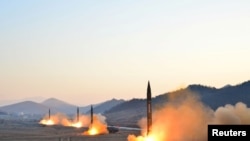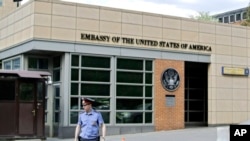The United States Congress has approved a bill placing new sanctions on Russia, Iran and North Korea.
The measure passed both houses of Congress this week. The vote in the House was 419-3, while the Senate approved it 98-2.
If President Donald Trump signs the bill, it becomes law. If he vetoes it, Congress is likely to override the veto to allow it to become law.
White House communications director Anthony Scaramucci left open the possibility that Trump could reject the new sanctions. He told CNN on Thursday the president might decide to veto, then try to “negotiate an even tougher deal against the Russians.”
Top lawmakers from both parties criticized a possible presidential veto.
“I think that would be a very bad mistake,” Senate Majority Whip John Cornyn, a Texas Republican, told VOA. “What would be better is if they [White House officials] worked with us on the legislation.”
Democratic Senator Ben Cardin of Maryland said the bill gives Trump a better negotiating position with Russian President Vladimir Putin. “If he vetoes it, it means he doesn’t want a stronger hand in dealing with Mr. Putin,” Cardin said.
The bill places economic restrictions on many Russian industries. Russia’s economy has already felt the effects from 2014 sanctions placed in response to Moscow’s annexation of Crimea from Ukraine.
The new sanctions are meant to punish Russia for that action. They are also a response to U.S. intelligence findings that Russia took steps to interfere in the U.S. presidential election. President Putin has repeatedly denied his government had any involvement in trying to influence the American election.
In addition to Russia, the bill places sanctions on North Korea for its continued nuclear program. The measure bars North Korean ships from operating in American waters or docking at U.S. ports. The ban extends to ships from nations not following United Nations resolutions against North Korea. The bill bans goods produced by North Korea’s forced labor from entering the U.S.
Also, the legislation punishes people involved in Iran's ballistic missile program and anyone doing business with them. It also places restrictions on Iran's Revolutionary Guards.
Russia was quick to criticize passage of the bill and answered with its own diplomatic measures.
The Russian foreign ministry said the sanctions were evidence of “extreme aggression of the U.S. in international affairs.” Russian officials called in outgoing U.S. ambassador John Tefft in Moscow to inform him of its own countermeasures.
Russia ordered the U.S. to cut hundreds of diplomatic positions in the country to match the number of Russian diplomatic workers in the United States. In addition, Russia said it would block entry to two diplomatic properties in Moscow.
The European Union expressed its concerns, saying the new sanctions could harm Europe’s energy industry. Several nations – including Germany and France – said the sanctions might harm businesses that carry Russian natural gas through pipelines.
Senior Republicans said they had responded by making changes to the bill to deal with some of the European concerns.
I’m Bryan Lynn.
Bryan Lynn wrote this story for VOA Learning English, based on reports from VOA News, the Associated Press and Reuters. Mario Ritter was the editor.
We want to hear from you. Write to us in the Comments section, and visit our Facebook page.
_____________________________________________________________
Words in This Story
sanction – n. measure taken against a country to cause it to obey international laws or requirements
override – v. make something no longer valid
annexation – n. the taking over of another country’s territory
retaliate – v. respond with action against something
countermeasure – n. action intended to stop or prevent something bad or unwanted








